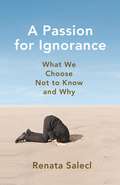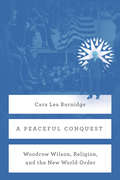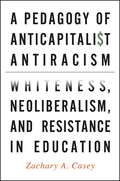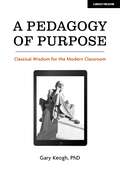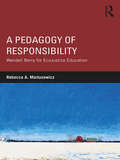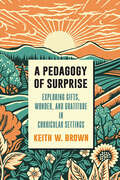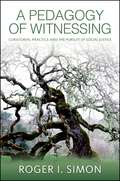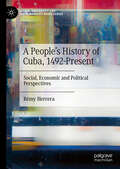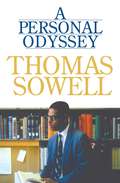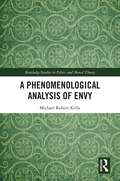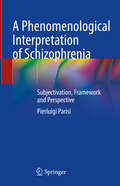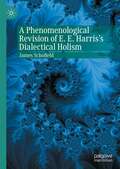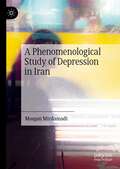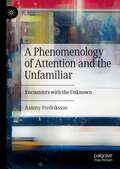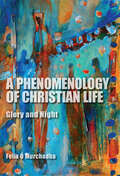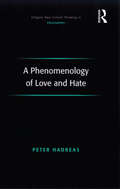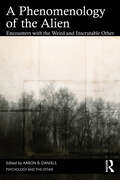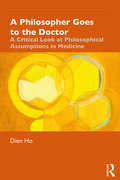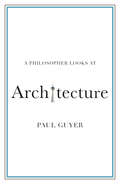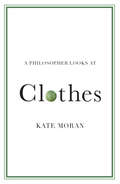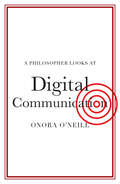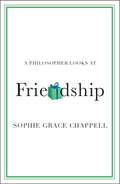- Table View
- List View
A Passion for Democracy: American Essays
by Benjamin R. BarberBenjamin Barber is one of America's preeminent political theorists. He has been a significant voice in the continuing debate about the nature and role of democracy in the contemporary world. A Passion for Democracy collects twenty of his most important writings on American democracy. Together they refine his distinctive position in democratic theory. Barber's conception of "strong democracy" contrasts with traditional concepts of "liberal democracy," especially in its emphasis on citizen participation in central issues of public debate. These essays critique the "thin representation" of liberal democracy and buttress the arguments presented in Barber's twelve books, most recently in his well-received Jihad vs. McWorld: How Globalism and Tribalism Are Re-shaping the World. In these pieces, Barber argues for participatory democracy without dependence on abstract metaphysical foundations, and he stresses the relationship among democracy and civil society, civic education, and culture. A Passion for Democracy is divided into four sections. In the first, "American Theory: Democracy, Liberalism, and Rights," Barber addresses issues of ongoing relevance to today's debates about the roots of participatory democracy, including individualism vs. community, the importance of consent, and the irrelevance of Marxism. Essays in the second section, "American Practice: Leadership, Citizenship, and Censorship" provide a "strong democracy" critique of American democratic practice. "Education for Democracy: Civic Education, Service, and Citizenship" applies Barber's theories to three related topics and includes his much-discussed essay "America Skips School." The final section, "Democracy and Technology: Endless Frontier or End of Democracy?" provides glimpses into a future that technology alone cannot secure for democracy. In his preface, Barber writes: "In these essays ... I have been hard on my country. Like most ardent democrats, I want more for it than it has achieved, despite the fact that it has achieved more than most people have dared to want." This wide-ranging collection displays not only his passion for democracy, but also his unique perspective on issues of abiding importance for the democratic process.
A Passion for Ignorance: What We Choose Not to Know and Why
by Renata SaleclAn original and provocative exploration of our capacity to ignore what is inconvenient or traumaticIgnorance, whether passive or active, conscious or unconscious, has always been a part of the human condition, Renata Salecl argues. What has changed in our post-truth, postindustrial world is that we often feel overwhelmed by the constant flood of information and misinformation. It sometimes seems impossible to differentiate between truth and falsehood and, as a result, there has been a backlash against the idea of expertise, and a rise in the number of people actively choosing not to know. The dangers of this are obvious, but Salecl challenges our assumptions, arguing that there may also be a positive side to ignorance, and that by addressing the role of ignorance in society, we may also be able to reclaim the role of knowledge.Drawing on philosophy, social and psychoanalytic theory, popular culture, and her own experience, Salecl explores how the passion for ignorance plays out in many different aspects of life today, from love, illness, trauma, and the fear of failure to genetics, forensic science, big data, and the incel movement—and she concludes that ignorance is a complex phenomenon that can, on occasion, benefit individuals and society as a whole.The result is a fascinating investigation of how the knowledge economy became an ignorance economy, what it means for us, and what it tells us about the world today.
A Passion for Ignorance: What We Choose Not to Know and Why
by Renata SaleclAn original and provocative exploration of our capacity to ignore what is inconvenient or traumaticIgnorance, whether passive or active, conscious or unconscious, has always been a part of the human condition, Renata Salecl argues. What has changed in our post-truth, postindustrial world is that we often feel overwhelmed by the constant flood of information and misinformation. It sometimes seems impossible to differentiate between truth and falsehood and, as a result, there has been a backlash against the idea of expertise, and a rise in the number of people actively choosing not to know. The dangers of this are obvious, but Salecl challenges our assumptions, arguing that there may also be a positive side to ignorance, and that by addressing the role of ignorance in society, we may also be able to reclaim the role of knowledge.Drawing on philosophy, social and psychoanalytic theory, popular culture, and her own experience, Salecl explores how the passion for ignorance plays out in many different aspects of life today, from love, illness, trauma, and the fear of failure to genetics, forensic science, big data, and the incel movement—and she concludes that ignorance is a complex phenomenon that can, on occasion, benefit individuals and society as a whole.The result is a fascinating investigation of how the knowledge economy became an ignorance economy, what it means for us, and what it tells us about the world today.
A Peaceful Conquest: Woodrow Wilson, Religion, and the New World Order
by Cara Lea BurnidgeA century after his presidency, Woodrow Wilson remains one of the most compelling and complicated figures ever to occupy the Oval Office. A political outsider, Wilson brought to the presidency a distinctive, strongly held worldview, built on powerful religious traditions that informed his idea of America and its place in the world. With A Peaceful Conquest, Cara Lea Burnidge presents the most detailed analysis yet of how Wilson's religious beliefs affected his vision of American foreign policy, with repercussions that lasted into the Cold War and beyond. Framing Wilson's intellectual development in relationship to the national religious landscape, and paying greater attention to the role of religion than in previous scholarship, Burnidge shows how Wilson's blend of Southern evangelicalism and social Christianity became a central part of how America saw itself in the world, influencing seemingly secular policy decisions in subtle, lasting ways. Ultimately, Burnidge makes a case for Wilson's religiosity as one of the key drivers of the emergence of the public conception of America's unique, indispensable role in international relations. As the presidential election cycle once again raises questions of America's place in the world, A Peaceful Conquest offers a fascinating excavation of its little-known roots.
A Pedagogy of Anticapitalist Antiracism: Whiteness, Neoliberalism, and Resistance in Education
by Zachary A. CaseyWinner of the 2018 Outstanding Book Award presented by the Society of Professors of EducationThrough an analysis of whiteness, capitalism, and teacher education, A Pedagogy of Anticapitalist Antiracism sheds light on the current conditions of public education in the United States. We have created an environment wherein market-based logics of efficiency, lowering costs, and increasing returns have worked to disadvantage those populations most in need of educational opportunities that work to combat poverty. This book traces the history of whiteness in the United States with an explicit emphasis on the ways in which the economic system of capitalism functions to maintain historical practices that function in racist ways. Practitioners and researchers alike will find important insights into the ways that the history of white racial identity and capitalism in the United States impact our present reality in schools. Casey concludes with a discussion of "revolutionary hope" and possibilities for resistance to the barrage of dehumanizing reforms and privatization engulfing much of the contemporary educational landscape.
A Pedagogy of Purpose: Classical Wisdom for the Modern Classroom
by Dr Gary KeoghA Pedagogy of Purpose offers a completely fresh take on key problems in the education system. Gary Keogh argues that the education system has lost its way; it has become mechanistic, vapid, driven by an obsession with dubious measurements and led by a very narrow understanding of what it means to succeed. It has lost its sense of purpose. Using many real classroom examples, Keogh provides a new way forward, demonstrating how insights from classical philosophy can have a positive influence on crucial issues in education like student behaviour, assessment, attendance, the quality of teaching and learning, and perhaps most importantly, the mental health of students and teachers.
A Pedagogy of Purpose: Classical Wisdom for the Modern Classroom
by Dr Gary KeoghA Pedagogy of Purpose offers a completely fresh take on key problems in the education system. Gary Keogh argues that the education system has lost its way; it has become mechanistic, vapid, driven by an obsession with dubious measurements and led by a very narrow understanding of what it means to succeed. It has lost its sense of purpose. Using many real classroom examples, Keogh provides a new way forward, demonstrating how insights from classical philosophy can have a positive influence on crucial issues in education like student behaviour, assessment, attendance, the quality of teaching and learning, and perhaps most importantly, the mental health of students and teachers.
A Pedagogy of Responsibility: Wendell Berry for EcoJustice Education
by Rebecca A. MartusewiczDrawing on the theories of author and conservationist Wendell Berry for the field of EcoJustice Education, this book articulates a pedagogy of responsibility as a three-pronged approach grounded in the recognition that our planet balances an essential and fragile interdependence between all living creatures. Examining the deep cultural roots of social and ecological problems perpetuated by schools and institutions, Martusewicz identifies practices, relationships, beliefs, and traditions that contribute to healthier communities. She calls for imaginative re-thinking of education as an ethical process based in a vision of healthy, just, and sustainable communities. Using a critical analytical process, Martusewicz reveals how values of exploitation, mastery, and dispossession of land and people have taken hold in our educational system and communities, and employs Berry’s philosophy and wisdom to interrogate and develop a "pedagogy of responsibility" as an antidote to such harmful ideologies, structures, and patterns. Berry’s critical work and the author’s relatable storytelling challenge taken-for-granted perspectives and open new ways of thinking about teaching for democratic and sustainable communities.
A Pedagogy of Surprise: Exploring Gifts, Wonder, and Gratitude in Curricular Settings
by Keith W. BrownCombines theory and practice to inspire teachers to embrace a sense of surprise in their classrooms.What would your classroom be like if you could see it as something surprising, novel, and fresh in every moment? What are the unique gifts that students and teachers alike bring to classrooms? Through a combination of robust theory, in-depth scholarship, and practical exercises for teachers, A Pedagogy of Surprise is a vital resource that allows teachers to explore how they can bring a sense of wonder, surprise, and gratitude into their experiences of the classroom. It will delight and inspire anyone with an interest in using contemplation, mindfulness, and reflection to enhance teacher wellness. Topics include how a phenomenology of surprise can inform and enhance the teaching and curricular experience, the gift economy as applied to the classroom, the meaning and scope of gratitude practices in curricular settings, and applications of surprise, gifts, and gratitude to teaching. The final chapter includes inspiring visualizations that teachers of any grade can apply to feel more gifted, surprised, and connected within their classroom milieu.
A Pedagogy of Witnessing: Curatorial Practice and the Pursuit of Social Justice (SUNY series, Transforming Subjects: Psychoanalysis, Culture, and Studies in Education)
by Roger I. SimonThis outstanding comparative study on the curating of "difficult knowledge" focuses on two museum exhibitions that presented the same lynching photographs. Through a detailed description of the exhibitions and drawing on interviews with museum staff and visitor comments, Roger I. Simon explores the affective challenges to thought that lie behind the different curatorial frameworks and how viewers' comments on the exhibitions perform a particular conversation about race in America. He then extends the discussion to include contrasting exhibitions of photographs of atrocities committed by the German army on the Eastern Front during World War II, as well as to photographs taken at the Khmer Rouge S-21 torture and killing center. With an insightful blending of theoretical and qualitative analysis, Simon proposes new conceptualizations for a contemporary public pedagogy dedicated to bearing witness to the documents of racism.
A People’s History of Cuba, 1492-Present: Social, Economic and Political Perspectives (Global University for Sustainability Book Series)
by Rémy HerreraThis book presents a comprehensive history of the political economy of Cuba from 1492 to the present day. It chronologically analyses the major economic, social and political transformations that have occurred in Cuba and explores the impact on the country’s development over the long run. The first section analyses the period from 1492 to 1898, from colonial conquest to the war of independence. The next two sections cover the history of Cuba’s economy and society up to the end of the twentieth century, examining in detail US imperialist domination, guerrilla warfare (1956-1958) and the Cuban Revolution from 1959 to the fall of the Soviet Union in 1990-1991. The final part analyses Cuba’s economy and society in transition up to the present day. Written in a comprehensive academic style while maintaining a focus on the perspectives and experience of ordinary citizens throughout, the book will be of interest to a wide readership including scholars of economic history, political and social history, development economics and political economy.
A Personal Odyssey
by Thomas SowellThis is the gritty story of one man's lifelong education in the school of hard knocks, as his journey took him from Harlem to the Marines, the Ivy League, and a career as a controversial writer, teacher, and economist in government and private industry. It is also the story of the dramatically changing times in which this personal odyssey took place. The vignettes of the people and places that made an impression on Thomas Sowell at various stages of his life range from the poor and the powerless to the mighty and the wealthy, from a home for homeless boys to the White House, as well as ranging across the United States and around the world. It also includes Sowell's startling discovery of his own origins during his teenage years. If the child is father to the man, this memoir shows the characteristics that have become familiar in the public figure known as Thomas Sowell already present in an obscure little boy born in poverty in the Jim Crow South during the Great Depression and growing up in Harlem. His marching to his own drummer, his disregard of what others say or think, even his battles with editors who attempt to change what he has written, are all there in childhood. More than a story of the life of Sowell himself, this is also a story of the people who gave him their help, their support, and their loyalty, as well as those who demonized him and knifed him in the back. It is a story not just of one life, but of life in general, with all its exhilaration and pain.
A Phenomenological Analysis of Envy (Routledge Studies in Ethics and Moral Theory)
by Michael Robert KellyThis book provides a phenomenological analysis of envy. The author’s account takes a descriptive look at the whole experience of envy as it pertains to the envier’s sense of self and the envied.Philosophical work on envy has predominately focused on how the envier perceives, thinks about, or schemes against the person envied. This book proposes a phenomenological analysis of envy that articulates its essentially comparative character according to which we can further incorporate the role of the envier. This approach offers a novel contribution in three ways. First, it develops a notion of two predominant ways in which envy expresses itself: one that is bad for the envied and the other that is bad for the envier. Second, it renews the traditional defense of the view that envy is bad or vicious. Third, it provides original phenomenological descriptions of differences between envy and covetousness, indignation, emulation, ressentiment, and jealousy. By drawing on literary sources and social scientific literature, the author provides concrete examples of the lived experience of an envier.A Phenomenological Analysis of Envy will appeal to researchers and advanced students working in ethics, moral psychology, phenomenology, and philosophy of emotion.
A Phenomenological Interpretation of Schizophrenia: Subjectivation, Framework and Perspective
by Pierluigi ParisiIn this book the author develops a novel, philosophically-psychopathologically founded theory of schizophrenia and its basic disorder. After the introduction with the presentation of the basic concept, the further study is divided into five chapters, each of which first gives a conceptual overview, then includes and analyzes clinical phenomena and research results in detail. The originality and creativity of the work essentially consists in using the terms mentioned as “passe-partout”, as it were, which allow the most diverse, often disparate phenomena and symptoms of schizophrenia to be viewed from an integrating point of view. The method used is phenomenological, descriptive, and interpretative, drawing on a wealth of empirical research results, but at the same time being re-viewed and reorganized in the subjective-perspective framework concept.
A Phenomenological Revision of E. E. Harris's Dialectical Holism
by James SchofieldThe purpose of this work is to critically assess Errol E. Harris’s process philosophy in the face of contemporary research in the special sciences. Harris devoted his life to grappling with the big questions concerning the relationships between nature, mind, and knowledge. His 70-plus year career was distinguished, his texts on the history of philosophy, philosophy of science, political philosophy, philosophy of religion, and consciousness were widely published, and yet his metaphysics has until now remained excluded from mainstream discussions. This book’s contention is that Harris’s work reveals as yet unnoticed connections between theories in numerous scientific disciplines ranging from psychology to cosmology and that an examination of certain theories within these disciplines may serve to strengthen his original arguments. This work maintains that the resulting metaphysics frames a transdisciplinary paradigm shift and provides a viable solution to the hard problem of consciousness.
A Phenomenological Study of Depression in Iran
by Moujan MirdamadiThis book is an investigation into cultural variations in experiences of depression. Examining first-person accounts of depressed persons in Iran alongside similar previously studied data from the UK, the book highlights the cultural shaping at the heart of variations in experiences, manifestations, and articulations of depression. The analyses presented appeal to some of the longstanding pillars of Iranian culture, such as folk theories and literature, as well as the dominant social influences, like the Iran-Iraq war and the Islamic revolution. A central claim made, therefore, is that contrary to the universalising approaches in psychiatry, a better understanding of the workings of mental illness is achieved by situating individuals and their experience in a meaning-making sociocultural context.
A Phenomenology of Attention and the Unfamiliar: Encounters with the Unknown
by Antony FredrikssonBuilding on the thriving discussion on the role of attention within the phenomenological tradition, from Aron Gurwitsch and Merleau-Ponty to Bernhard Waldenfels, this book investigates the enigmatic role of attention as a faculty that enables change within subjective and intersubjective experience. The aim of the book is to reveal some characteristics of the processes in which subjects are unmade and remade, and to highlight how we are able to change our relation to an empirical world that nevertheless has unity and constancy in our perception.
A Phenomenology of Christian Life: Glory And Night
by Felix Ó MurchadhaHow does Christian philosophy address phenomena in the world? Felix Ó Murchadha believes that seeing, hearing, or otherwise sensing the world through faith requires transcendence or thinking through glory and night (being and meaning). By challenging much of Western metaphysics, Ó Murchadha shows how phenomenology opens new ideas about being, and how philosophers of "the theological turn" have addressed questions of creation, incarnation, resurrection, time, love, and faith. He explores the possibility of a phenomenology of Christian life and argues against any simple separation of philosophy and theology or reason and faith.
A Phenomenology of Love and Hate (Ashgate New Critical Thinking in Philosophy)
by Peter HadreasUsing phenomenology to uncover the implicit logic in personal love, sexual love, and hatred, Peter Hadreas provides new insights into the uniqueness of the beloved and offers fresh explanations for some of the worst outbreaks of violence and hatred in modern times. Topics discussed include the value and subjectivity of personal love, nudity and the temporality of sexual love, the connection between personal, sexual love, and the incest taboo, the development of group-focused hatred from individual focused hatred, and prejudicial discrimination. The work encompasses analysis of philosophers and writers from ancient times through to the present day and examines such episodes as the Oklahoma City Federal Building bombing and the Columbine High School massacre.
A Phenomenology of the Alien: Encounters with the Weird and Inscrutable Other (Psychology and the Other)
by Aaron B. DanielsA Phenomenology of the Alien: Encounters with the Weird and Inscrutable Other considers both literal and figurative experiences of the alien from a psychological, psychoanalytic and philosophical perspective.Throughout the book, the authors wrestle with the unexplained, ineffable, unspeakable, sublime, uncanny, abject and Miéville’s abcanny. This collection provides phenomenologies of encounters with the inscrutably alien from lights in the sky, dark corners of Weird fictional landscapes, architecture, technology, or the clinical symptom. The chapters examine fictional and nonfictional encounters with what exceeds the capacity to “make sense,” taking a new approach to the topic of alterity and inviting the reader to examine how these encounters reflect our contemporary condition culturally, individually, clinically, theologically and philosophically.Bridging cultural, psychoanalytic, literary, clinical, media, and religious studies, the novel approaches in this volume will be of interest to students and scholars alike.
A Philosopher Goes to the Doctor: A Critical Look at Philosophical Assumptions in Medicine
by Dien HoThis book sheds light on important philosophical assumptions made by professionals working in clinical and research medicine. In doing so, it aims to make explicit how active philosophy is in medicine and shows how this awareness can result in better and more informed medical research and practice. It examines: what features make something a scientific discipline; the inherent tensions between understanding medicine as a research science and as a healing practice; how the “replication crisis” in medical research asks us to rethink the structure of knowledge production in our modern world; whether explanations have any real scientific values; the uncertainties about probabilistic claims; and whether it is possible for evidence-based medicine to truly be value free. The final chapter argues that the most important question we can ask is not, “How can we separate values from science?” but, “In a democratic society, how can we decide in a politically and morally acceptable way what values should drive science?” Key features: introduces complex philosophical issues in a manner accessible to non-professional academics; critically examines philosophical assumptions made in medicine, providing a better understanding of medicine that can lead to better healthcare; integrates medical examples and historic contexts so as to frame the rationale of philosophical views and provide lively illustrations of how philosophy can impact science and our lives; uses inter-connected chapters to demonstrate that disparate philosophical concepts are deeply related (e.g., it shows how the aims of medicine inform how we should understand theoretical reasoning).
A Philosopher Looks at Architecture (A Philosopher Looks At)
by Paul GuyerWhat should our buildings look like? Or is their usability more important than their appearance? Paul Guyer argues that the fundamental goals of architecture first identified by the Roman architect Marcus Pollio Vitruvius - good construction, functionality, and aesthetic appeal - have remained valid despite constant changes in human activities, building materials and technologies, as well as in artistic styles and cultures. Guyer discusses philosophers and architects throughout history, including Alberti, Kant, Ruskin, Wright, and Loos, and surveys the ways in which their ideas are brought to life in buildings across the world. He also considers the works and words of contemporary architects including Annabelle Selldorf, Herzog and de Meuron, and Steven Holl, and shows that - despite changing times and fashions - good architecture continues to be something worth striving for. This new series offers short and personal perspectives by expert thinkers on topics that we all encounter in our everyday lives.
A Philosopher Looks at Clothes (A Philosopher Looks At)
by Kate MoranClothes are much more than just what we put on in the morning. They express our identity; they can be an independent statement or the result of coercion; and they have deeply entrenched historical, political, and social aspects. Kate Moran explores the connections between clothes and philosophy, showing how clothes can illustrate and pose philosophical problems, and how philosophical ideas influence clothing. She discusses what it might mean for an article of clothing to be beautiful; how we communicate with clothes; how we use clothes to navigate our social existence; and how our social existence leaves its mark on our clothes. She also considers the curious relationship between philosophers and children's clothes, legal restrictions on clothing, textile waste, and labor conditions of textile workers. Her absorbing and engaging portrait of our clothes helps us to understand an important and underexplored aspect of our lives.
A Philosopher Looks at Digital Communication (A Philosopher Looks At)
by Onora O'NeillCommunication is complicated, and so is the ethics of communication. We communicate about innumerable topics, to varied audiences, using a gamut of technologies. The ethics of communication, therefore, has to address a wide range of technical, ethical and epistemic requirements. In this book, Onora O'Neill shows how digital technologies have made communication more demanding: they can support communication with huge numbers of distant and dispersed recipients; they can amplify or suppress selected content; and they can target or ignore selected audiences. Often this is done anonymously, making it harder for readers and listeners, viewers and browsers, to assess which claims are true or false, reliable or misleading, flaky or fake. So how can we empower users to assess and evaluate digital communication, so that they can tell which standards it meets and which it flouts? That is the challenge which this book explores.
A Philosopher Looks at Friendship (A Philosopher Looks At)
by Sophie Grace ChappellWhat is it to be a friend? What does the role of friend involve, and why? How do the obligations and prerogatives associated with that role follow on from it, and how might they mesh, or clash, with our other duties and privileges? Philosophy often treats friendship as something systematic, serious, and earnest, and much philosophical thought has gone into how 'friendship' can formally be defined. How indeed can friendship be good for us if it doesn't fit into a philosopher's neat, systematising theory of the good? For Sophie Grace Chappell, friendship is neither systematic nor earnest, yet is certainly one of the greatest goods of life. Drawing on well-known examples from popular culture, and examining these alongside recent philosophical, political, social, and theological debates, Chappell demystifies and redefines friendship as a highly untidy and many-sided good, and certainly also as one of the most central goods of human experience.

